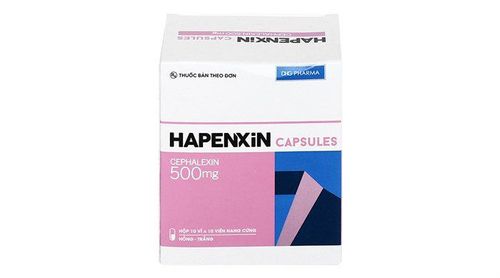This is an automatically translated article.
Moxifloxacin is a drug belonging to the group of broad-spectrum antibiotics used to treat bacterial infections such as skin infections, acute bacterial infections of bronchitis... Let's find out some information about dosage, usage and side effects. of the drug before use in the following article.
1. What is the effect of Melocin?
Melocin is a drug manufactured by J.Duncan Healthcare Pvt. Ltd of India. The main ingredient of the drug is moxifloxacin which belongs to the group of quinolone antibiotics, which works by stopping the growth of bacteria.
With the above ingredients, Melocin is only used in the treatment of bacterial infections, completely ineffective in the treatment of diseases caused by viral infections such as colds and flu.
2. Indications and contraindications to the drug Melocin
2.1. Indications Melocin is indicated in the following cases:
Patients with mild and moderate community-acquired pneumonia. Patients with infections of the skin and subcutaneous tissues. Treatment of acute infections caused by chronic bronchitis. Patients with acute sinusitis due to bacterial infection. 2.2. Contraindications To use the drug effectively, patients should note that Melocin is contraindicated in the following cases:
Melocin is contraindicated in people who are sensitive to moxifloxacin, other quinolones. The patient has a prolonged QT interval and is taking class III and IA antiarrhythmic drugs. Children under 18 years old or people with a history of hypersensitivity to any of the ingredients in the drug.
3. Side effects when using Melocin
During the use of Melocin, patients may encounter some problems such as:
Common side effects: Dizziness, vomiting, diarrhea. Uncommon side effects: Abdominal pain, dry mouth, dyspepsia, mild taste disturbance. Occasionally patients may experience headaches, convulsions, depression, confusion, tremors, restlessness, anxiety, somnolence, or insomnia. In addition, patients may present with itching, erythema, increased amylase, lactate dehydrogenase, arthralgia, myalgia. Rare side effects: QT interval prolongation, rupture of the Achilles tendon and other tendons, diarrhea due to C.difficile. Some cases have hallucinations, vision disturbances, depression, and suicidal thoughts. After taking the drug, if you see any abnormal signs such as nausea, vomiting, abdominal pain, nervous system symptoms, skin... then the patient needs to take the drug immediately and consult. by your treating doctor or pharmacist.
4. Usage and dosage of Melocin
4.1. How to use Melocin is used orally, when using the patient should drink a lot of water. Use the correct dose as directed, absolutely do not take more or less than prescribed by the specialist. After a few days of taking the medicine, if you feel your symptoms improve, you should ask your doctor about the schedule to continue taking the medicine or not. Absolutely do not arbitrarily stop taking the drug early or skip the dose halfway, because it can lead to reinfection. If you find that the disease does not improve or the symptoms become more severe, contact your treating doctor for advice on how to deal with it. 4.2. Dosage Melocin is used for adults with a dose of 400 mg x 1 time / day. Depending on the condition, the recommended time of taking the drug is as follows:
Patients with acute sinusitis caused by bacteria, pneumonia should take the drug for 10 days. Patients with infections of the skin and subcutaneous tissue used the drug for a period of 7 days. Patients with acute bacterial exacerbations of chronic bronchitis take the drug for a period of 5 days. The above dosage information is for reference only, so patients should consult a doctor for the best indication.
5. Melocin drug interactions
Melocin drug interacts with alcoholic and carbonated drinks, reducing the effect of the drug. Therefore, you absolutely should not use these drinks while being treated with Melocin. In addition, you also need to inform your doctor about the drugs or supplements you are using for advice, to avoid unintended drug interactions.
6. Treatment of overdose, missed dose of Melocin
Management of missed dose: You can take the medicine as soon as you remember, about 1-2 hours after a missed dose. If it's been too long since you missed a dose, skip it and take your next dose as usual. Treatment of overdose: Overdose may appear signs such as headache, nausea, dizziness ... At this time, the patient should be closely monitored, taken to the emergency room when necessary to prevent the situation. Bad things happen very quickly.
7. Some important notes when taking Melocin
During the use of Melocin, patients should note some of the following issues:
Pregnant and lactating women need to be careful when using Melocin, consult a doctor before deciding to use it. medicine. For drivers, operating machines, Melocin can be used for this subject because the drug does not affect mental health and concentration. Do not use the drug when there are abnormal signs such as mold, drug color change, watery discharge. Above is some information about Melocin drug that readers can refer to. Because this is a broad-spectrum antibiotic, patients need to use it exactly as directed by the doctor, avoiding self-use can lead to extremely dangerous antibiotic resistance.
Follow Vinmec International General Hospital website to get more health, nutrition and beauty information to protect the health of yourself and your loved ones in your family.
Please dial HOTLINE for more information or register for an appointment HERE. Download MyVinmec app to make appointments faster and to manage your bookings easily.













